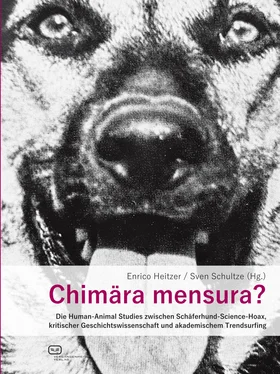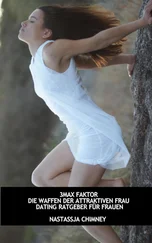Enrico Heitzer / Sven Schultze (Hg.)
Chimära mensura?
Die Human-Animal Studies zwischen Schäferhund-Science-Hoax, kritischer Geschichtswissenschaft und akademischem Trendsurfing
Impressum
Bibliografische Informationen der Deutschen Nationalbibliothek
Die Deutsche Nationalbibliothek verzeichnet diese Publikation in der Deutschen Nationalbibliografie; detaillierte bibliografische Daten sind im Internet über
http://dnb.d-nb.de abrufbar.
ISBN: 978-3-86408-239-9
Coverabbildung: Vergangenheitsverlag
© Copyright: Vergangenheitsverlag, Berlin / 2018
www.vergangenheitsverlag.de
Alle Rechte, auch die des Nachdrucks von Auszügen, der fotomechanischen und digitalen Wiedergabe und der Übersetzung, vorbehalten.
Vorwort
Peter Boghossian
Einleitung
Enrico Heitzer & Sven Schultze
Debatten-Reader
Der deutsch-deutsche Schäferhund.
Ein Beitrag zur Gewaltgeschichte des Jahrhunderts der Extreme
Christiane Schulte
Interviews aus der Zeitschrift sub\urban. zeitschrift für kritische stadtforschung
„Kritische Wissenschaft braucht einen Begriff von Gesellschaft“
Christiane Schulte & Freund_innen
Die Human-Animal Studies zwischen wissenschaftlicher Distanz und politischem Engagement.
Ein Gespräch über Wissenschaft, Politik und Gesellschaft mit Chimaira – Arbeitskreis für Human-Animal Studies e. V.
Markus Kurth, Aiyana Rosen & Helen Keller
„Schulte et al. haben nicht nur den Finger in die Wunde gelegt, sie sind auch Ausdruck derselben.“
Ilko-Sascha Kowalczuk
Kultur statt Wissenschaft?
Chimära mensura?
Reflexionen über das wissenschaftliche und erkenntnistheoretische Potential der Human-Animal Studies
Sven Schultze
Im Reich der wilden Tierrechtler.
Anmerkungen zur Kritik an Tierrechten und Human-Animal Studies
Heiko Werning
Christiane Schulte gegen die Human-Animal Studies:
Warum eine politische Kritik keine wissenschaftliche Auseinandersetzung ersetzt
Markus Kurth
Von turn zu turn zu turn?
Schäferhunde, die bellen, beißen nicht.
Der Schäferhund-Hoax als Symptom akademischen Trendsurfings
Florian Peters
Normalisierung des Absurden?
Das „Simon-und-Garfinkel-Prinzip“ und die kommunikative Validierung von Nonsens
Thomas Hoebel
„Es ist der gleiche Hund, nur mit einem anderen Halsband“.
Über politische Erkenntnisinteressen und wissenschaftliche Erkenntnispotenziale alter und neuer Forschungsparadigmata
Enrico Heitzer
Hoaxes als Kommunikationsmedium
Publish and Perish.
Publikationszwänge, selbstunternehmerische Wissenschaftssubjekte und Geschlecht
Antonia Schmid & Peter Ullrich
Ernst beiseite!
Humoristische Interventionen in den Wissenschaftsbetrieb
Oliver Lauenstein
Ohne Witterung.
Oder warum Studierende den ‚Geruch‘ eines Textes nicht (mehr) bemerken. Von der Aneignung des Schäferhund-Textes in einem BA-Seminar
Heiner Stahl
Autorenporträts
Dank an die Crowd
The further a discipline is from reality, the easier it is to hoax. And the easier it is to hoax, the angrier scholars in that field become once it is hoaxed. The reasons for anger are many. A bogus paper that passes the peer-reviewed process shows, 1) there are either serious problems with the peer-reviewed mechanism in that journal or the entire discipline is operating in make-believe-land, 2) scholars have wasted a considerable amount of time, money, and effort in a bogus field, and most interestingly, 3) they are morally motivated to believe that their scholarly efforts are of indispensable importance. Successful hoaxes should force every honest scholar to take a long, hard look at their discipline of study and bluntly ask themselves if they should still pursue lines of inquiry that have been exposed as fraudulent.
The best analogue for this are the countless videos on YouTube of martial arts “masters” (almost always in ancient, Eastern disciplines) who effortlessly destroy wave after wave of assailants. Many of these masters do so without ever having touched their opponents. Attackers just fly through the air, as if by magic. To an onlooker, of course, this is absolutely remarkable. How can one person definitively incapacitate scores of attackers, many of whom are wielding bats and knives?
The answer is that he cannot. The assailants have bought into the delusion that their master has secret powers. Consequently, whether they realize it or not, they are complicit in the charade. It’s all bogus. All of it. The drills. The training. The attacks. They are all untethered to reality. And the more time participants spend practicing their make-believe martial art, the more invested they become—invested in convincing themselves of its efficacy and of their own powers.
All it takes to show that the Emperor has no clothes is to find one individual who actually knows how to fight and who’s not bought into this collective delusion. (Usually that person is an amateur MMA, or Mixed Martial Arts, practitioner.) Then it’s straightforward: with basic rules and a referee, the master fights the Mixed Martial Artist. Time after time after time, the master loses ignominiously, usually in just a few seconds. His disciples are shocked. The most delusional among them manufacture elaborate excuses, from cheating opponents in collusion with the referee, to mystical forces (or big toes) being out of alignment, to chi energy being unbalanced. The rest of us, however, see it for what it is: a group of practitioners who, along with their leader, convinced themselves something worked when it didn’t.
This is almost exactly what happens when hoax papers are accepted in peer-reviewed journals. The master is the field. The willing participants in the charade are the scholars in that field. The hoax paper is the MMA fighter. Submission of the hoax paper is the challenge. Publication of the paper is the result.
In the case of hoax papers, what’s interesting is the reaction of the scholars in the particular field of study. Just as the master’s students, who have invested time, money, and energy into an activity that does not do what they thought it would do, become indignant, incredulous, and outraged, so too do the scholars in the field that was hoaxed. But there is one crucial difference. The master’s students don’t think they’re better people for practicing that particular art. That is, they don’t think the martial art makes them more moral, they just think it make them better fighters. (There are exceptions to this, of course. Some practitioners believe they’re more “moral,” but they interpret “morality” as meaning “possessing higher spiritual purity”.) And this is the crucial distinction. Gender scholars, for example, think they’re better people as a result of doing work they consider to be morally necessary. Consequently, they interpret hoaxes morally, in a way that mathematicians and physicists would not if their journals were hoaxed. That is to say, gender scholars can be fooled by nonsense if it is sufficiently aligned with their moral predilections.
This is why it’s particularly interesting that many martial arts masters solicit challenges and even offer hefty rewards if they can be defeated. They solicit challenges because they believe they can win. And they believe they can win because they believe their art does what they think it can do—defeat resisting opponents. Many postmodern scholars, for example, possess no such honesty because their moral minds have overridden their rational minds. That is, they perceive their discipline and their work within it as morally crucial. This causes them to interpret challenges as immoral and challengers as unethical, or worse. It also causes them, like the master’s most devote disciples, to rationalize hoaxes as failures or flukes.
Читать дальше











